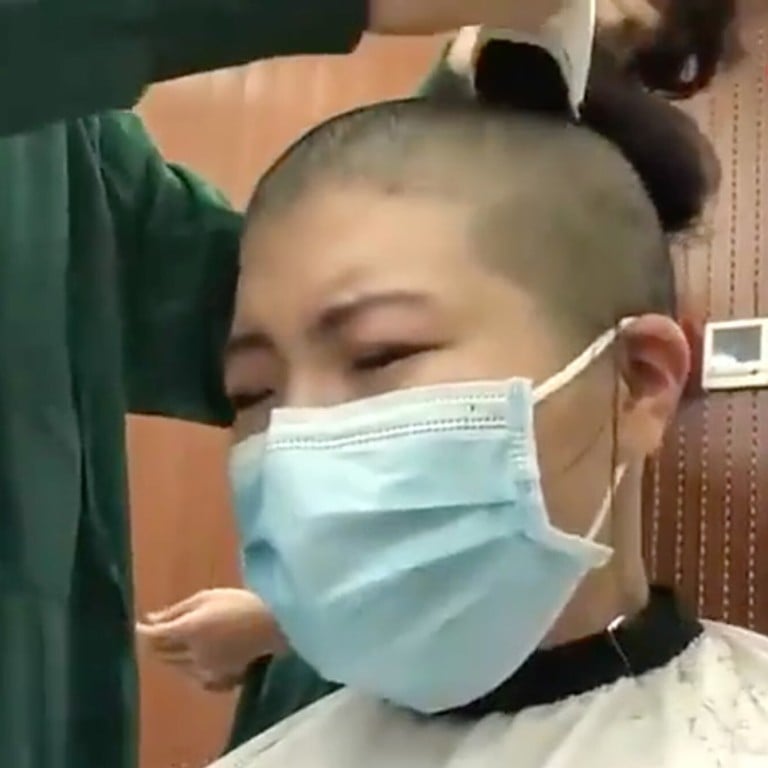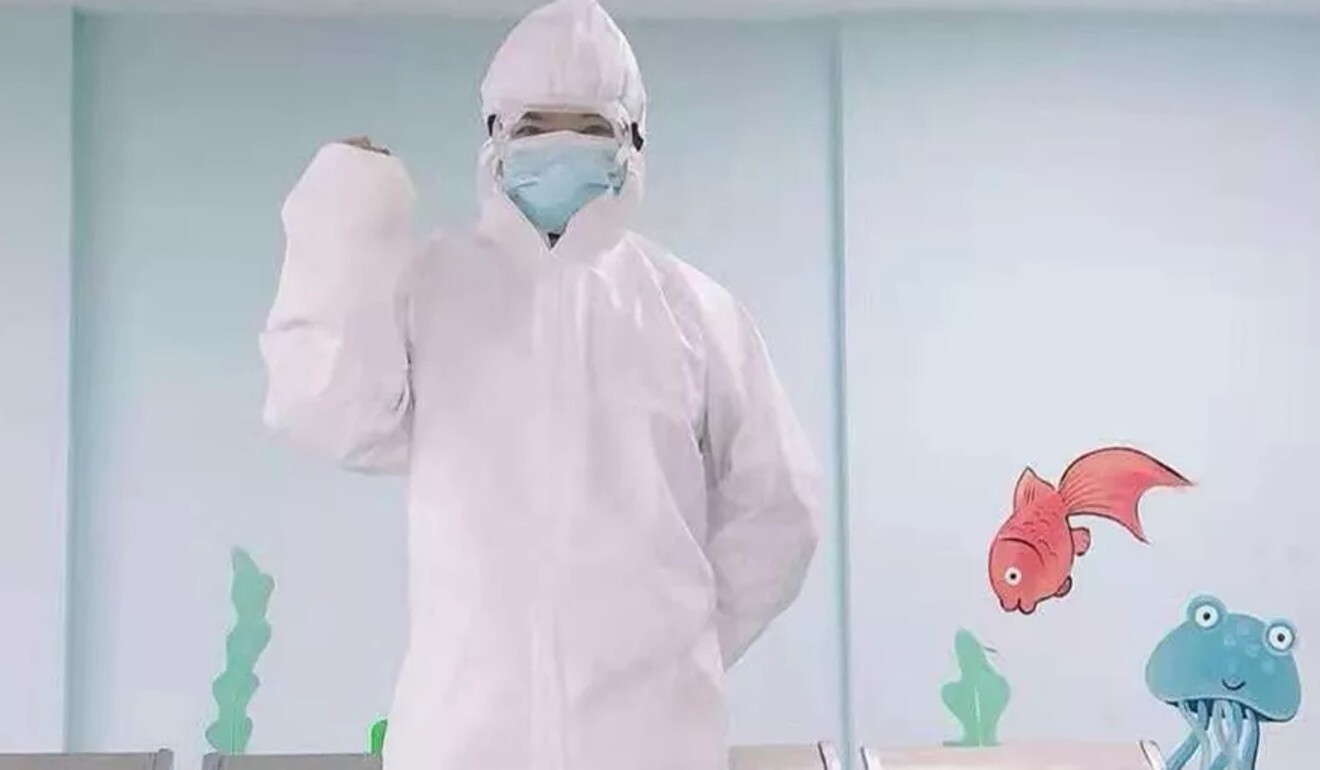
Chinese state media ‘humiliating’ women nurses in coronavirus propaganda campaign
- Reports praising heavily pregnant nurse who continued to work and woman who went back to her job early after miscarriage prompt backlash online
- Academics say they are disrespectful and inappropriate, and could put pressure on others
State broadcaster CCTV led the charge last week, describing a nurse who was in her last month of pregnancy as “a great mother and angel in a white gown” because she had continued to work in the emergency ward of a military hospital in Wuhan, the epicentre of the outbreak in central China.
Zhao Yu was due to give birth in 20 days when the report aired, and apparently insisted she should remain on duty at the General Hospital of Central China War Zone, which like other hospitals in the city was overwhelmed with virus patients. Although her colleagues had tried to talk her out of it, she said she wanted to share the burden.
But the report hailing the nurse’s devotion to her job did not get the intended response online.
After many social media users raised concern about a heavily pregnant nurse working in a highly contagious and difficult environment, the video clip was withdrawn from CCTV’s website.
“I’m not touched at all – on the contrary, I’m angry,” read one of many similar comments on Weibo, China’s Twitter. “Shouldn’t a woman who’s nine months’ pregnant be at home? She’s in such thick protective clothes and it’s hard for her to even move around. Can that be good for her baby?”

The next day, a report in Wuhan Evening News told the story of another nurse who had returned to work just 10 days after she had surgery following a miscarriage.
It said Huang Shan, 27, who works at the Wuhan Central Hospital, should have rested for 28 days following the procedure, but she returned from sick leave much earlier because the outbreak was worsening and her colleagues were struggling to cope with the crisis.
The nurse normally worked in oncology, but when she went back at the end of January she was assigned to the coronavirus isolation ward – something she kept from her family because she did not want to worry them. At first she felt exhausted by the work, but after a few days she adapted to the high-pressure work environment, according to the report, which met with a similar reaction online.

Hou Hongbin, a feminist writer in Guangzhou, said the reports were disrespectful and it was “inhumane” to let the two nurses keep working.
“Hospitals should not be allowing a nurse who is nine months’ pregnant – or the one who’d had a miscarriage – work. Their immune systems are weakened, and it’s highly possible that they will be infected with the virus themselves,” Hou said.
Her views were echoed by Huang Lin, a feminist researcher and professor at Capital Normal University in Beijing, who called the reports inappropriate.
“Even during an epidemic, medical staff need to protect themselves first,” she said.
As the virus continued to spread earlier this month, and public anger over handling of the outbreak mounted, the internet was also abuzz with reports of women nurses having their heads shaved to help control the spread of the disease. Their hospitals said the women were “willing” to do this, but some nurses were seen in video footage weeping while their hair was cut off.
Hou said having nurses take such an extreme step was unnecessary.
“Medical workers in Wuhan, whether they’re male or female, don’t need to shave their heads, and the epidemic control guidelines issued by the health authorities have never said they should do this,” she said. “These reports are just propaganda, and they’re the result of bullying women nurses. They’re humiliating these nurses, but they present it as if they are making a sacrifice.”
China’s communist youth idols get the thumbs down in coronavirus crisis
Shen Yifei, an associate professor in sociology at Fudan University and director of its Family Study Centre in Shanghai, agreed. She said at first, several nurses had their hair cut very short and were seen in photos looking pleased on social media. Later, hospitals arranged for more women nurses to have their heads shaved in front of the cameras, and that was when the public sentiment turned, she said.
“It’s very apparent that the authorities have their own agenda here,” Shen said.
She said the reports about women nurses were misleading, and could put pressure on others.
“Medical workers should be praised for their performance at work, not anything to do with their female features,” she said.
There have also been reports of women working on the front line not having access to sanitary pads in hospitals, with some taking birth control pills to avoid having their periods.
“This is part of a bigger phenomenon, that women are overlooked in the workplace,” said feminist writer Hou. “Their normal biological needs are stigmatised.”
There was a slight improvement for women medical workers in Wuhan last week. After rights activists called for their needs to be met, the authorities and manufacturers sent supplies of disposable underwear designed for periods to hospitals in the city, according to Hou.
Media expert Wei Wuhui, from Shanghai Jiao Tong University, said if the media on the mainland was independent and the nurses were being honest, there would be no problem. But since the stories had all come from media backed by the government, they were more about swaying public opinion.
“The authorities are hoping that people will be moved by these heroic deeds and will forget that this epidemic has partly been caused by officials’ malpractice,” he said.
Huang Lin, from Capital Normal University, said the media should also be looking at the why the epidemic happened.
“It’s all right for the media to report on ‘positive energy’ and praise medical staff, but it shouldn’t just be promoting the sacrifices made by a vulnerable group in society,” she said. “Many people will take this sacrifice and devotion for granted.”
Purchase the China AI Report 2020 brought to you by SCMP Research and enjoy a 20% discount (original price US$400). This 60-page all new intelligence report gives you first-hand insights and analysis into the latest industry developments and intelligence about China AI. Get exclusive access to our webinars for continuous learning, and interact with China AI executives in live Q&A. Offer valid until 31 March 2020.

